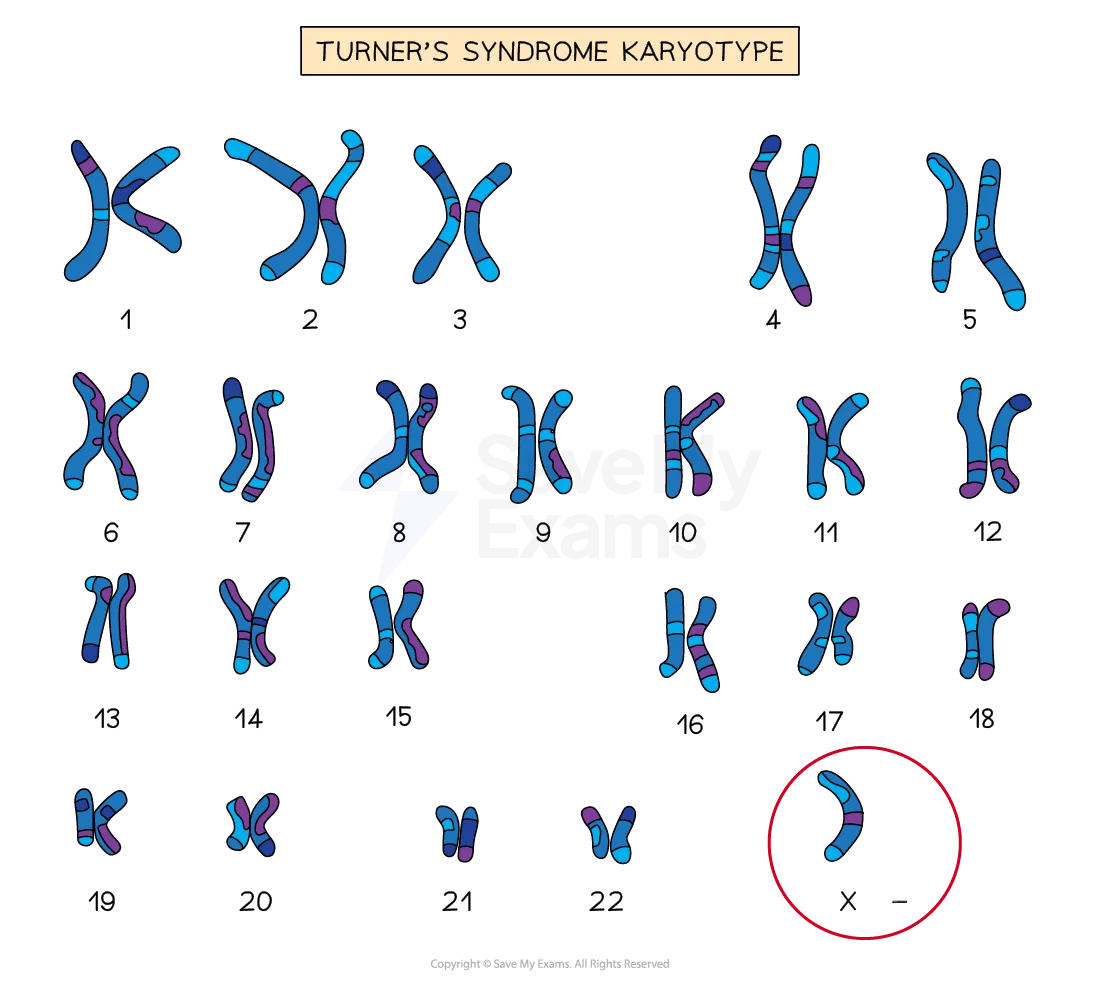Syllabus Edition
First teaching 2017
Last exams 2026
Atypical Sex Chromosome Patterns (AQA A Level Psychology): Revision Note
Exam code: 7182
Klinefelter's syndrome
Any combinations of sex chromosomes other than XX (female) and XY (male) are referred to as atypical
These patterns can be inherited or may occur at conception or be due to division of the human reproductive cells before conception
All babies will have an X chromosome, as human life cannot exist without this, but XXY, XYY, and XO (where the additional X is missing) are all possible
Klinefelter’s Syndrome (KS)
KS affects about 1 in every 600 males (Klinefelter’s Syndrome Association, 2023) and involves having an extra X (female) chromosome, giving the atypical sex chromosome pattern of XXY and an excess of oestrogen in the body
KS is due to an error in the egg cell when it develops and before it is fertilised or if the father’s sperm carries an extra X chromosome
KS may not be discovered until puberty, especially in the case of the much more common and milder ‘mosaic’ KS, where only some of the boy’s cells have the XXY chromosomal pattern and the others are normal
KS is incurable, but treatment with additional testosterone can increase muscle and bone development, though it cannot not reverse infertility
The characteristics of Klinefelter’s Syndrome
Physical | Cognitive |
Small testes, producing low levels of testosterone, and small penis | Poor language skills that affect reading and writing abilities |
No facial hair and limited pubic and body hair | Poor mathematical skills |
Broader hips, long legs and arms in relation to the torso and development of breast tissue | Quiet, shy temperament with attention difficulties |
Delayed or incomplete puberty (some boys do not go through puberty at all) and infertility is likely | Increased risk of anxiety disorders and/or depression |

Klinefelter’s Syndrome karyotype.
Turner's syndrome
Affects about 1 in every 2,000 live female births (Turner Syndrome Support Society, 2023) and involves having all or part of an X chromosome missing, denoted by the atypical sex chromosome pattern XO
In genetic terms, the foetus is neither male nor female because the second sex-determining chromosome is absent
However, babies with TS are born and develop as females because there is no Y chromosome to direct the foetal gonads to develop male characteristics
TS occurs at conception, and the cause is not precisely known but is thought, like KS, to be due to an error in the division of a parent’s reproductive cells, either in the father’s sperm or the mother’s egg
TS also has a ‘mosaic’ form where only some cells are affected
Most affected females will require hormone replacement therapy to develop breasts and normal female body contours, undergo proper bone growth and begin menstruation
Characteristics of Turner’s Syndrome
Physical | Cognitive |
Delayed onset of puberty and underdeveloped ovaries leading to menstruation problems and infertility | Usually of average or above-average cognitive ability and with a high level of verbal skill |
Short in height, with a webbed neck, narrow hips and broad shoulders | Some social adjustment problems due to others’ responses to their appearance |
Often have heart and kidney abnormalities | Visuospatial skills may be impaired |

Turner’s Syndrome karyotype.
Research which investigates atypical sex chromosome patterns
DeLisi et al (2005) conducted a clinical interview, cognitive tests and an MRI scan on KS and non-KS individuals and found that 10 out of 11 of the KS participants had mental health and cognitive issues and also had smaller frontal lobes, temporal lobes and superior temporal gyrus brain areas, suggesting a biological basis for their language deficits and cognitive difficulties
Quigley et al. (2014) investigated the positive effects of oestrogen replacement therapy in treating TS and found that if treated before puberty, then females with TS would have a greater increase in breast tissue, suggesting early diagnosis and treatment is vital
Evaluation of atypical sex chromosome patterns research
Strengths
Research into both KS and TS has allowed for early intervention with hormone treatment and, in some cases, the freezing of sperm or eggs to counteract the infertility of both groups
The identification of KS and TS has led to the growth of online support groups for the individuals with the syndromes and their relatives, where they can be well informed about advances in knowledge and treatment and they can communicate with others in the same position
Limitations
Research into KS and TS lacks population validity, as those who are diagnosed with these syndromes will be those with the severest symptoms and therefore research is based on an unrepresentative sample, as it excludes those who have milder symptoms, who are often those with the mosaic form
Research into both syndromes also ignores individual differences in the symptoms and progression of symptoms, meaning that diagnosis and treatment may lack validity, being based on generalised assumptions rather than on an individual basis
Issues & Debates
Conditions arising from atypical sex chromosomes, such as KS and TS strongly support the nature side of the nature vs nurture debate, as they arise from genetic and hormonal variations present from conception
However, nurture also plays a role in how individuals experience and interpret their identity and development, especially in societies with rigid gender norms
Research and treatment conditions such as KS and TS must navigate ethical concerns, such as informed consent for early hormone treatment and the risk of medicalising natural variation
The topic is socially sensitive, especially regarding labelling, stigma, and assumptions about ‘normality’ in sex development

Unlock more, it's free!
Was this revision note helpful?